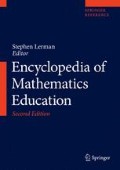Access this chapter
Tax calculation will be finalised at checkout
Purchases are for personal use only
References
Apple M (1995) Taking power seriously: new directions in equity in mathematics education and beyond. In: Secada W, Fennema E, Adajian L (eds) New directions in equity in mathematics education. Cambridge University Press, Cambridge, pp 329–348
Bourdieu P (1998) Practical reason. Polity Press, Cambridge
Burton L (ed) (1990) Gender and mathematics. An international perspective. Cassell, London
Cahan S, Linchevski L, Ygra N, Danziger L (1996) The cumulative effect of ability grouping on mathematical achievement: a longitudinal perspective. Stud Educ Eval 22(1):29–40
Ernest P (2007) Why social justice? Philos Math Educ J 21:2. http://people.exeter.ac.uk/PErnest/pome21/index.htm
Gates P (2006) The place of equity and social justice in the history of PME. In: Guitierrez A, Boero P (eds) Handbook of research on the psychology of mathematics education. Past, present and future. Sense, Rotterdam, pp 367–402
Gates P, Jorgensen R (2009) Foregrounding social justice in mathematics teacher education. J Math Teach Educ 12(3):161–170
Herman B, Kidron Y, Riccards JB (2010) Gender equity in mathematics education. Asia-Pacific Economic Cooperation Secretariat, Singapore
Jorgensen R, Gates P, Roper V (2013) Structural exclusion through school mathematics: using Bourdieu to understand mathematics a social practice. Educ Stud Math. https://doi.org/10.1007/s10649-013-9468-4. Published online 07 Feb 2013
Lerman S (2000) The social turn in mathematics education research. In: Boaler J (ed) Multiple perspectives on mathematics teaching and learning. Ablex, Westport, pp 19–44
Lubienski S (2000a) Problem solving as a means towards mathematics for all: an exploratory look through a class lens. J Res Math Educ 31(4):454–482
Lubienski S (2000b) A clash of cultures? Students’ experiences in a discussion-intensive seventh grade mathematics classroom. Elem Sch J 100:377–403
Lubienski S (2007) Research, reform and equity in US mathematics education. In: Nasir N, Cobb P (eds) Improving access to education. Diversity and equity in the classroom. Teachers College Press, New York, pp 10–23
Pellino K (2007) The effects of poverty on teaching and learning. http://www.teach-nology.com/tutorials/teaching/poverty/print.htm. Accessed 4 Sept 2013
Secada W (1989) Agenda setting, enlightened self-interest and equity in mathematics education. Peabody J Educ 66(1):22–56
Skovsmose O (2011) An invitation to critical mathematics education. Sense, Rotterdam
Zevenbergen R (2000) “Cracking the code” of mathematics classrooms: school success as a function of linguistic, social and cultural background. In: Boaler J (ed) Multiple perspectives on mathematics teaching and learning. Ablex, Westport, pp 201–223
Zevenbergen R (2003) Ability grouping in mathematics classrooms: a Bourdieuian analysis. Learn Math 23(3):5–10
Zohar A (1999) Teachers’ metacognitive knowledge and the instruction of higher order thinking. Teach Teach Educ 15(4):413–429
Zohar A, Dori Y (2003) Higher order thinking skills and low-achieving students: are they mutually exclusive? J Learn Sci 12(2):145–181
Zohar A, Degani A, Vaaknin E (2001) Teachers’ beliefs about low-achieving students and higher order thinking. Teach Teach Educ 17:469–485
Author information
Authors and Affiliations
Corresponding author
Editor information
Editors and Affiliations
Section Editor information
Rights and permissions
Copyright information
© 2020 Springer Nature Switzerland AG
About this entry
Cite this entry
Gates, P. (2020). Equity and Access in Mathematics Education. In: Lerman, S. (eds) Encyclopedia of Mathematics Education. Springer, Cham. https://doi.org/10.1007/978-3-030-15789-0_58
Download citation
DOI: https://doi.org/10.1007/978-3-030-15789-0_58
Published:
Publisher Name: Springer, Cham
Print ISBN: 978-3-030-15788-3
Online ISBN: 978-3-030-15789-0
eBook Packages: EducationReference Module Humanities and Social SciencesReference Module Education

